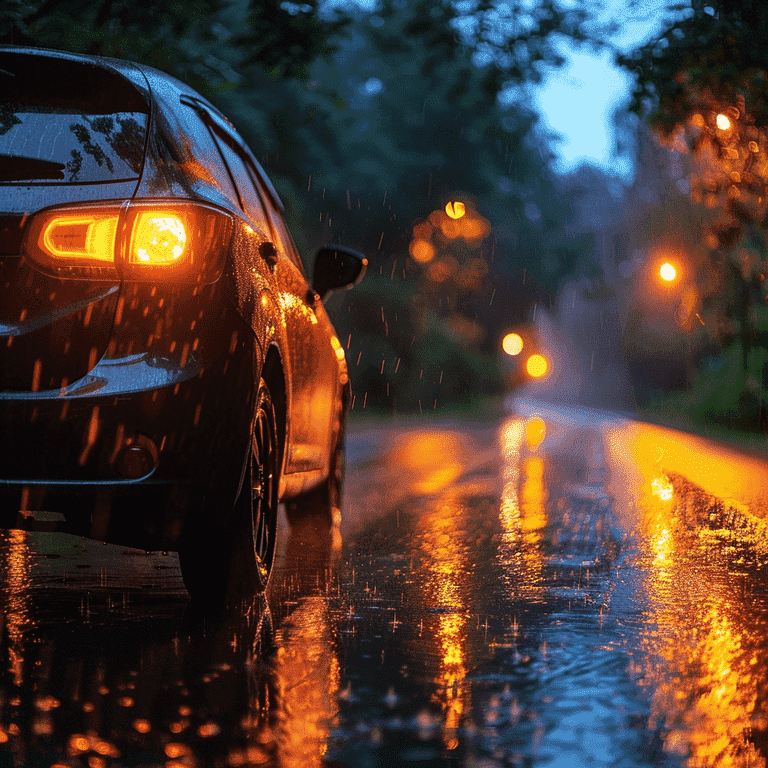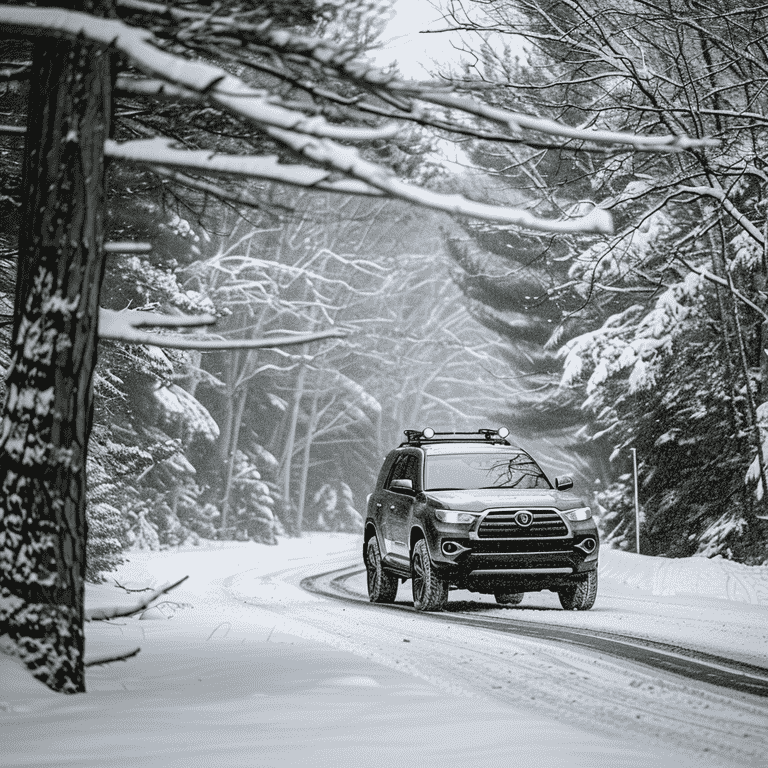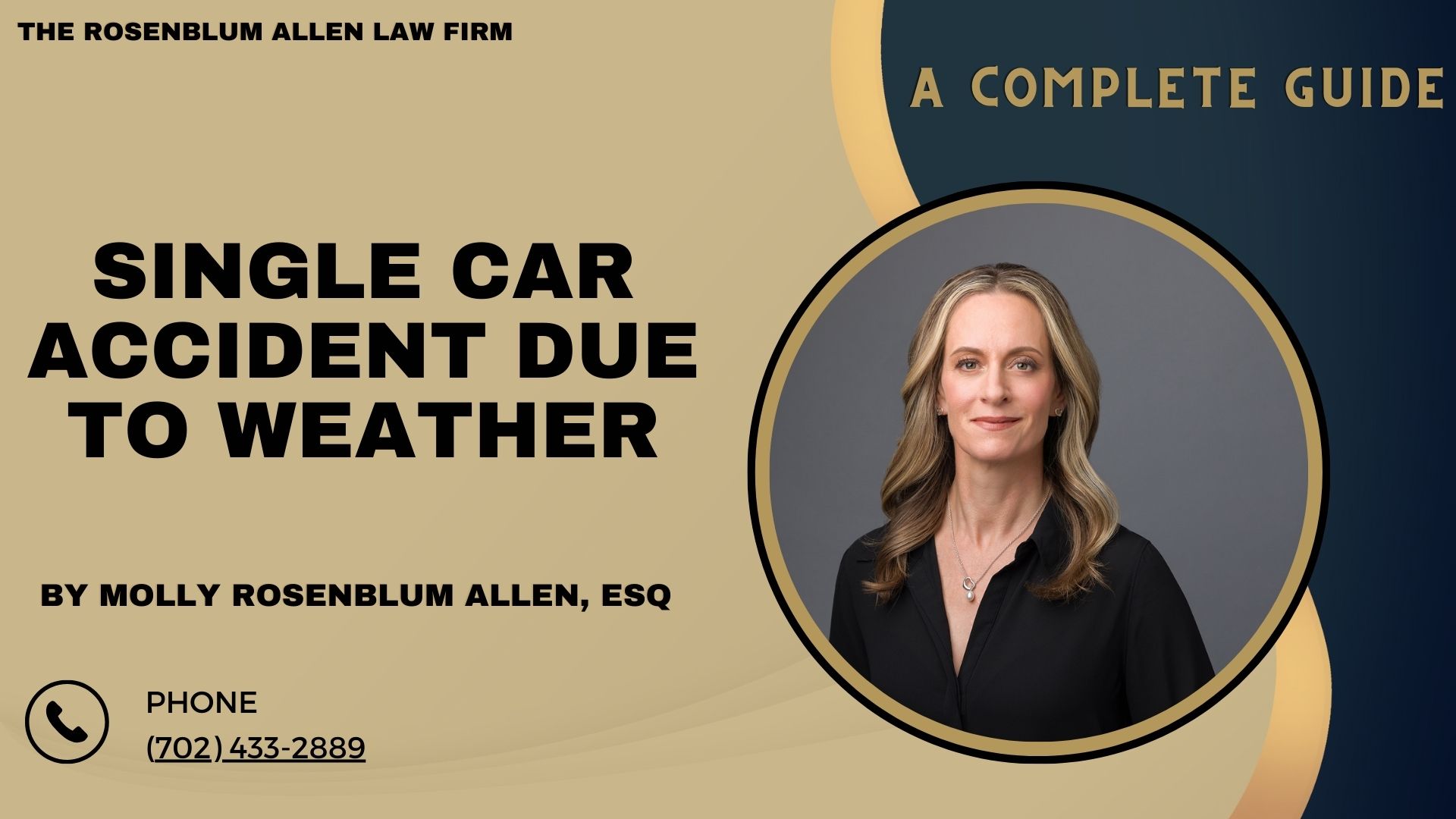Picture driving on a quiet road when suddenly, the weather changes. Before you know it, your car is spinning out of control. Single-car accidents like these are scary. But, they are not uncommon, especially when the weather turns bad. This guide will walk you through understanding these accidents. It will also tell you what to do if you find yourself in one.
The Impact of Weather on Driving Conditions
Common Weather Conditions Leading to Accidents
Different types of weather can make roads dangerous. Here are a few to watch out for:
Rain and Flooding: Wet roads can reduce your car’s grip, leading to skids.
Snow and Ice can make it hard to control your vehicle and stop properly.
Fog and Reduced Visibility: Fog makes seeing other vehicles and road signs difficult.
Wind and Debris: Strong winds can push your car off course or into the path of obstacles.
Understanding how these conditions affect driving can help you stay safe.
How Weather Affects Road Safety
Weather doesn’t just make the road slippery. It can also:
Make it hard to see.
Reduce the effectiveness of your car’s brakes.
Make controlling your vehicle more challenging.
Knowing this can help you adjust your driving to stay safe.

Legal Considerations in Weather-Related Accidents
Determining Fault and Negligence
After a weather-related accident, you might wonder who is at fault. Here’s what to consider:
‘Act of God’: Sometimes, weather conditions are so extreme that the accident couldn’t have been avoided, no matter what the driver did.
Driver Responsibility: Even in bad weather, drivers must drive safely. You might be found at fault if you moved too fast for the conditions.
Insurance Implications
Here’s how a weather-related accident might affect your insurance:
What Your Policy Covers: Many policies cover accidents caused by weather, but you should check yours to be sure.
Navigating Claims: Filing a claim for a weather-related accident is similar to other claims, but be ready to explain how the weather played a role.

Steps to Take Immediately After a Single Car Accident Due to Weather
It might feel like chaos when you find yourself in a single-car accident because of bad weather. But there are clear steps you can follow to make things easier and safer for everyone involved.
Ensuring Safety: What to Do Right After the Accident
First things first, safety is your top priority.
- Checking for Injuries: Quickly see if you or anyone else in the car is hurt. If yes, try to stay calm and call for medical help immediately.
- Moving to a Safe Location: If the vehicle is in a dangerous spot and it’s safe to move, try to get to the side of the road. Otherwise, turn on your hazard lights to alert other drivers.
Documenting the Accident Scene
Once you’re safe, it’s essential to document the scene.
- Taking Photos and Notes: Use your phone to take pictures of the road conditions, the car, and any relevant signs or signals. This can be very helpful later.
- Collecting Witness Statements, If Any: If people saw what happened, kindly ask for their contact information. They could help you explain the situation later.
Reporting the Accident
Letting the right people know about the accident is crucial.
- When and How to Report to Authorities: You should report the accident to the police, especially if there were injuries or significant damage. They can provide a report that you might need for insurance claims.
- Informing Your Insurance Company: Call your insurance provider as soon as possible. They’ll guide you through the steps to take for your claim.

Preventive Measures to Avoid Single-Car Accidents in Bad Weather
Accidents can happen, but there are ways to reduce the risk, especially when bad weather is involved.
Vehicle Maintenance and Preparedness
Keeping your car in good shape is critical.
- Regular Checks and Seasonal Adjustments: Ensure your brakes, tires, and lights are in working order. Also, consider seasonal needs like snow tires in winter.
- Essential Safety Equipment for Different Weather Conditions: Having things like an emergency kit, a flashlight, and a first-aid kit in your car can be a big help if you get into trouble.
Safe Driving Practices
How you drive can make a big difference.
- Adjusting Speed to Conditions: Slow down when the weather gets bad. It might take longer to stop or turn on slippery roads.
- Keeping a Safe Distance from Other Vehicles: Give yourself more space than usual. This gives you more time to react if something unexpected happens.
Understanding Weather Forecasts and Planning Trips Accordingly
If you know bad weather is coming, it’s best to be prepared.
- Avoid unnecessary trips if severe weather is expected.
- Check the weather forecast before heading out, and plan your route to avoid known problem areas.

Breaking It All Down
Navigating bad weather on the roads can be scary. But, staying informed and prepared can greatly cut the risk of a solo car accident. Remember, safety comes first—for yourself and others on the road. By understanding the legal implications, take steps right after an accident. Also, adopt preventive measures. These things will protect you. They will help you make smart choices under tough conditions.
Driving in bad weather demands attention, caution, and respect for the elements. While we can’t control the weather, we can control how we respond. Regular vehicle maintenance is crucial. Safe driving practices and emergency preparedness are crucial too. They all help to avoid accidents. Suppose you find yourself in an unfortunate situation. In that case, knowing what to do next can ease recovery. It will help with legal and insurance.
Let this guide remind us that while the weather can be unpredictable, our actions don’t have to be. Stay safe, stay informed, and always drive with care.

Frequently Asked Questions
What should I do if my car is undrivable after a weather-related accident?
First, prioritize your safety. If your car is undrivable, contact a tow service to move it to a safe location. Many insurance companies offer roadside assistance or can recommend a towing service, so reach out to them promptly.
Can weather-related accidents affect my insurance rates?
Yes, weather-related accidents where you’re at fault could potentially increase your insurance rates. However, this depends on various factors such as your insurance policy, driving history, and the specifics of the accident. It’s advisable to discuss this with your insurance provider for clarity.
How can I prove the weather was the cause of my accident?
Documenting the scene is crucial. Take photos of the weather and road conditions at the time of the accident, gather relevant details, and obtain weather reports if possible. Witness statements can also support your claim by confirming that weather conditions significantly contributed to the accident.
What if I’m injured in a single-car accident due to weather?
Seek immediate medical attention, even for seemingly minor injuries, as some injuries may not manifest immediately. Reporting these injuries is essential for insurance or legal claims later on.
Are there any special considerations for driving in desert weather conditions?
Desert driving presents unique challenges, such as sudden dust storms reducing visibility. In such situations, it’s crucial to reduce speed, turn on headlights, and maintain a safe distance from other vehicles. If visibility drops to zero, pull over to a safe location and wait until conditions improve.
How do I handle a situation where my car gets stuck in snow or ice?
If your car becomes stuck in snow or ice, use a shovel and sand or kitty litter to gain traction. Keep warm supplies, such as blankets, in your car, and ensure your phone is charged. Inform someone of your location and situation in case you require assistance.
What should I include in my emergency kit for bad weather driving?
Your emergency kit should contain water, non-perishable food, blankets, a first-aid kit, a flashlight with spare batteries, a window breaker, a seatbelt cutter, road flares or an emergency beacon, and for winter driving, add a snow shovel, ice scraper, and sand or cat litter for traction.
How can I educate a new driver about driving safely in bad weather?
Educate new drivers about adjusting their driving speed according to weather conditions, maintaining a safe following distance, and ensuring regular vehicle maintenance. Encourage them to practice driving in various weather conditions under the supervision of an experienced driver before driving alone.

Glossary
- Act of God: A legal term referring to natural events outside of human control, such as floods, earthquakes, or severe weather, that are not caused by any human action. In the context of car accidents, it implies conditions so extreme that the accident could not have been prevented.
- Claim: A request made by an individual to their insurance company for coverage or compensation for a loss covered under their insurance policy, such as damage from a car accident.
- Fault: In legal terms, fault refers to the responsibility for an accident. Determining fault involves determining who was responsible for causing the accident and to what degree.
- Hazard Lights: Also known as warning flashers, these are flashing lights on a vehicle that indicate a hazard or emergency, signaling other drivers to proceed cautiously.
- Insurance Policy: A contract between an individual and an insurance company outlining the terms under which the insurance company agrees to cover losses and damages specified in the policy.
- Negligence: A legal concept referring to a failure to behave with the level of care that someone of ordinary prudence would have exercised under the same circumstances. In the context of driving, negligence might involve actions like speeding or not adhering to road safety rules.
- Regular Checks and Seasonal Adjustments: Routine inspections and modifications to a vehicle to ensure it is in optimal condition and adapted to changing seasonal weather conditions, such as installing snow tires in winter.
- Road Safety: Measures and precautions taken to prevent accidents and protect the safety of all road users, including drivers, passengers, pedestrians, and cyclists.
- Safe Driving Practices: Techniques and behaviors adopted by drivers to reduce the risk of accidents, such as adjusting speed according to weather conditions and maintaining a safe distance from other vehicles.
- Vehicle Maintenance: The regular inspection and repair of a vehicle to ensure it is safe to drive, including checks on brakes, tires, lights, and other crucial components.

Additional Resources for You
As you navigate through the complexities of dealing with weather-related single car accidents, remember you’re not alone. Our lead attorney, Molly Rosenblum Allen, Esq., has meticulously crafted additional resources to assist you in your time of need. Whether you’re facing challenges from a personal injury, a car accident, or more specific cases like motorcycle accidents, wrongful death, truck accidents, drunk driving incidents, or slip and fall accidents, we have a wealth of knowledge ready for you. Here are some valuable resources:
For comprehensive support and legal advice related to personal injuries in Las Vegas, explore our detailed guide at Las Vegas Personal Injury Attorney. This resource is designed to help you understand your rights and the steps to take following an injury.
If you’ve been involved in a car accident, find effective legal assistance and essential information at Las Vegas Car Accident Attorney. Our focus is on helping you navigate the legal process with ease.
Motorcycle accidents can be particularly challenging. For specialized support in these cases, visit Motorcycle Accident Lawyer Las Vegas, where you’ll find resources tailored to the unique aspects of motorcycle claims.
In the painful event of a wrongful death, we offer compassionate and skilled legal guidance. Learn more at Wrongful Death Lawyer Las Vegas to understand how we can support you through this difficult time.
For accidents involving trucks, which often result in complex legal challenges, our Truck Accident Attorney Las Vegas page provides specialized legal insights and assistance.
Drunk driving accidents are distressingly common and can have devastating consequences. For those affected, our Las Vegas Drunk Driving Accident Attorney resource offers dedicated support and legal advice.
Slips, trips, and falls can occur anywhere, often leading to significant injuries. Our Las Vegas Slip and Fall Attorney page is an essential resource for anyone who has suffered from such an accident and needs effective legal guidance.
Molly Rosenblum Allen, Esq. and the entire team at The Rosenblum Allen Law Firm are here to provide you with the support, knowledge, and legal expertise you need during challenging times. Our resources are designed to offer comprehensive guidance and advocacy to ensure your rights are protected and you receive the compensation you deserve.

Outside Resources for You
National Highway Traffic Safety Administration (NHTSA): NHTSA provides a wealth of information on vehicle safety, accident prevention, and driving tips for all types of weather conditions. Visit NHTSA’s homepage for comprehensive resources.
American Bar Association (ABA): The ABA offers resources on finding legal help, understanding your legal rights, and accessing public resources related to legal issues. Their homepage, American Bar Association, is a good starting point.
Insurance Information Institute (III): For detailed information on insurance coverage, claims processes, and how to handle accidents from an insurance perspective, the Insurance Information Institute’s homepage is invaluable.
National Weather Service (NWS): The NWS provides up-to-date weather alerts and safety tips for dealing with adverse weather conditions. Check out the National Weather Service homepage for the latest weather information.
Federal Emergency Management Agency (FEMA): FEMA offers advice on preparing for and responding to emergencies, including those caused by severe weather. Visit the Federal Emergency Management Agency homepage for resources on emergency preparedness.
American Association for Justice (AAJ): This organization supports the legal advocacy community, providing resources for those seeking justice in personal injury and other legal matters. The American Association for Justice homepage can guide you through finding support for your case.
SafeKids Worldwide: Focused on preventing injuries in children, SafeKids Worldwide offers resources for parents to ensure their children’s safety in and out of vehicles. Explore the SafeKids Worldwide homepage for child safety tips.

A Special Message from Our Lead Attorney, Molly Rosenblum Allen, Esq

Dear Reader,
Thank you so much for taking the time to explore our resources. I hope you found the info insightful and helpful. You are navigating a complex situation. We know legal issues can be tough. This is especially true for accidents and injuries.
At The Rosenblum Allen Law Firm, we commit to giving you support. We will also give you expertise and guidance. You need these during this time. Molly Rosenblum Allen, Esq., leads our team. We dedicate ourselves to working tirelessly on your behalf. Our goal is to achieve the best outcome for your case.
If you are ready to discuss your situation more and see how we can help you, please call us at (702) 433-2889. We do not offer a free consultation. But, we commit to tailoring great legal services to meet your needs.
Your trust in us is something we value deeply, and we look forward to the opportunity to serve you.
Warm regards,
Molly Rosenblum Allen, Esq.
The Rosenblum Allen Law Firm



